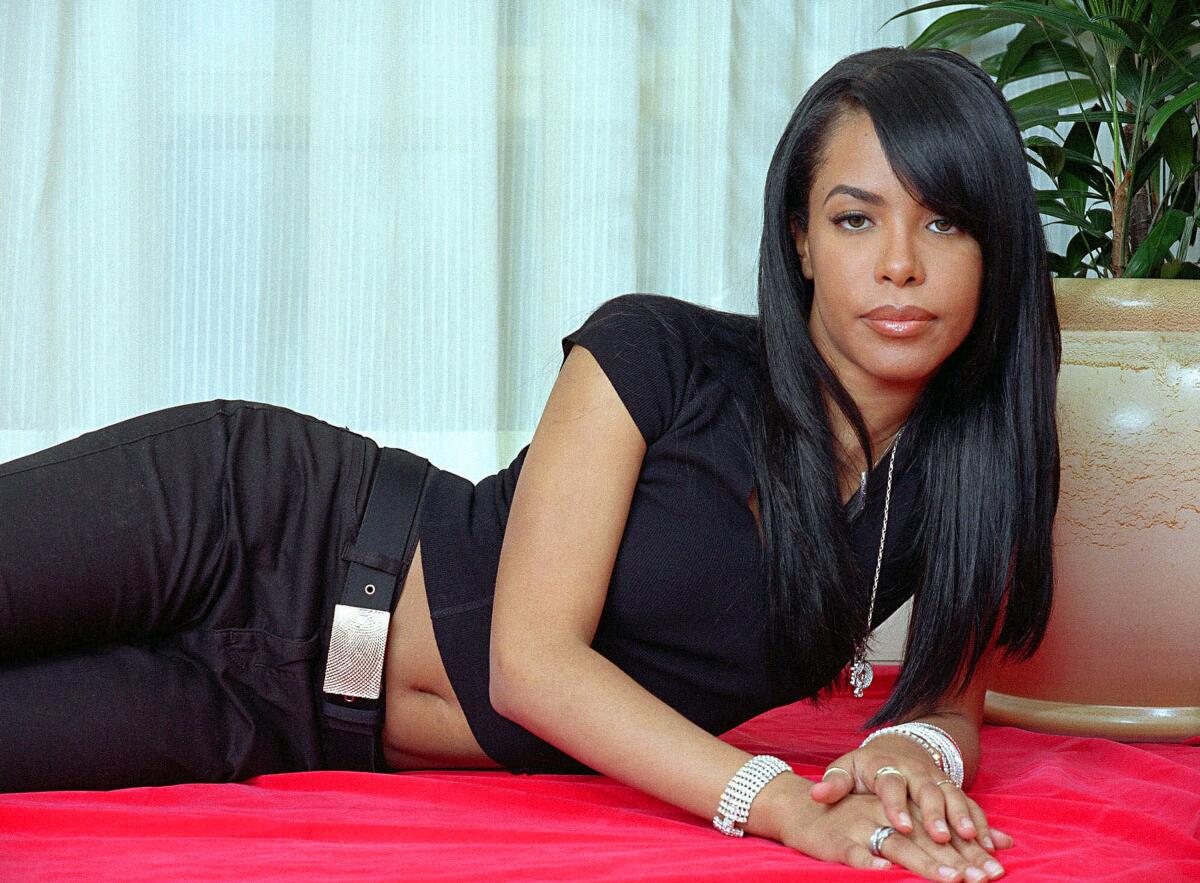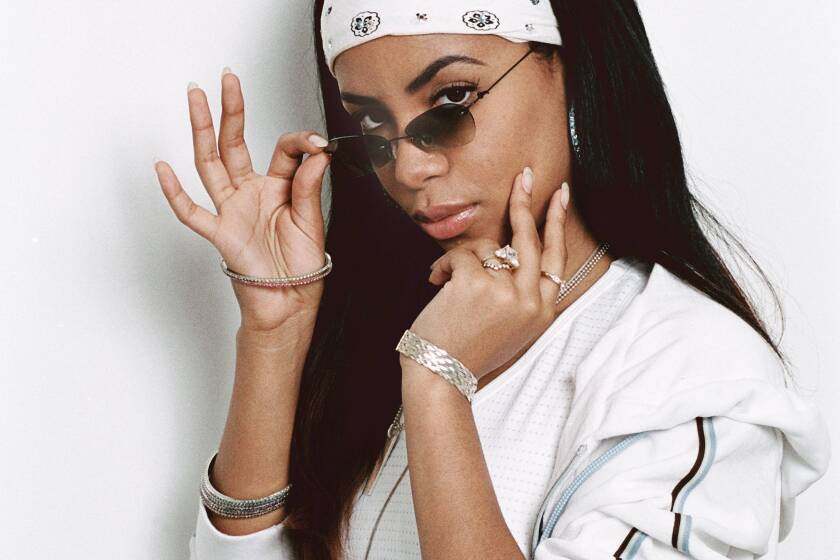20 years after her death, Aaliyah is still a mystery. But her music stands the test of time

Jimmy Jam can’t remember the executive’s name. But he definitely recalls the panic in his voice.
It was 1998, and the veteran songwriter and producer was at work with his longtime creative partner, Terry Lewis, on a movie project for the same studio preparing to release that year’s “Dr. Dolittle” reboot starring Eddie Murphy. Aaliyah, the 19-year-old R&B singer with a string of sultry hits, had just turned in her contribution to the “Dolittle” soundtrack, which left this Hollywood suit on the phone in need of reassurance from an experienced hand.
Today the song, “Are You That Somebody?,” is widely regarded as a masterpiece of end-of-the-century soul music, with Aaliyah’s cooing vocal laid over a fractured digital groove by producer Timbaland. Back then, though, the sound felt so fresh that even Jam — one of the architects behind some of Janet Jackson’s most adventurous songs — reeled when he cued up an advance copy.
Season 2 of ‘Black Girl Songbook,’ from veteran journalist Danyel Smith, premieres Wednesday with an episode on the late Aaliyah.
“I was like, ‘Wow, that’s a weird beat!’” he says with a laugh. “The production was so avant-garde, with the baby crying in the sample and everything bouncing from speaker to speaker. But by the end of it, I wasn’t listening to the production — I was listening to Aaliyah’s melody and her voice. That’s what made all the disjointedness work, because it was so grounding. She was carrying something off that most singers couldn’t have.
“I called the guy back and I said, ‘Listen, this is brilliant,’” Jam says. “And he goes, ‘Really? OK, great. Our people wanted to hear your opinion to form their own.’”
Two and a half decades later — and 20 years to the day after the singer’s tragic death at age 22 — everyone seems to share Jam’s view: Aaliyah, who died Aug. 25, 2001, in a plane crash in the Bahamas, has since become one of the most revered figures in modern R&B, with an army of devoted A-list fans (including Drake and Cardi B) and a clear influence on successors like SZA, Tinashe, Syd and Jhené Aiko.
Last month, Normani became the latest act to pay tribute with a sensual new single, “Wild Side,” that appears to interpolate a beat from Aaliyah’s song “One in a Million.”

“She set the blueprint for so many artists that came after her,” says Mjeema Pickett, head of R&B at Spotify — and this despite the fact that, until very recently, most of Aaliyah’s music was unavailable on streaming platforms due to a protracted legal dispute between her estate and her record label. The music could be found on YouTube, of course, by anyone willing to do a little searching. But in 2021 its absence on the services used by hundreds of millions of listeners was conspicuous.
So how did Aaliyah, who scored 11 top-10 hits on Billboard’s R&B chart, shape the future? For starters, she embraced the very notion of looking ahead. In the early ’90s, R&B was dominated by the hip-hop soul sound pioneered by Mary J. Blige, whose music was built on warm, dusty loops that borrowed (or at least called to mind) older songs. Yet Aaliyah, working with Timbaland and his partner Missy Elliott in tracks like “One in a Million” and “4 Page Letter,” devised gleaming productions full of proudly synthetic noises, remaking the steamy slow jam as a place for technical innovation. The music had soul but it didn’t conjure the bedroom or the church; it evoked a kind of virtual reality where humans’ romantic dramas played out under the surveilling eye of a machine.
“She didn’t try to follow what was already going on,” says Ty Dolla Sign, the L.A.-based singer and producer whose work — including a sleek new collaborative album with the Canadian duo Dvsn — similarly flaunts its state-of-the-art textures. “That whole ‘One in a Million’ swag, after that dropped, how many people did you hear where they tried to come with that same drum rhythm?”
Cleverly, Aaliyah used her often-startling arrangements — check out the mutant-funk bass line in “If Your Girl Only Knew” — to frame an understated vocal approach that could feel almost radically intimate. Instead of declaiming (à la Aretha Franklin or Whitney Houston), she insinuated, singing under her breath in a way that persists today not only in R&B but in whispery music by pop stars like Lorde and Billie Eilish. When SZA incorporates her exhalations into her phrasing, as in her song “Good Days,” that’s the Aaliyah effect; ditto when Syd floats the dreamy melody of a tune like The Internet’s “Girl” over a bed of squelching synth lines.

Jimmy Jam identifies an “emotional honesty” in Aaliyah’s music that he says made her “relatable” to her audience. “There are certain people that you listen to them when they sing, and then there are certain people you sing along with. Aaliyah had the voice that you sang along with. It never felt like a performance — ‘I’m gonna knock this out the park.’ She was just speaking to you.”
“She sounded like the homegirl,” says Ty Dolla Sign, who adds that the effect hasn’t worn off. “Even now, my daughter, she’s 16, she plays Aaliyah — knows all the songs, all the words.”
That relatability — further cultivated, Spotify’s Pickett says, by a “tomboy” image eventually emulated by Alicia Keys — papered over some of the more troubling aspects of Aaliyah’s story. Introduced to show business by her uncle Barry Hankerson (who’d been married to Gladys Knight and later founded Blackground Records), Aaliyah infamously ended up in a short-lived marriage with Hankerson’s client R. Kelly when she was only 15; Kelly, accused this week of marrying the singer so that she could get an abortion with his legal consent, wrote and produced Aaliyah’s 1994 debut, “Age Ain’t Nothing But a Number,” which for years was her only album available to stream.
Precisely why Aaliyah’s other LPs were held back isn’t clear. When Blackground announced plans to finally put the singer’s catalog online — 1996’s “One in a Million” premiered last week, while 2001’s “Aaliyah” is due Sept. 10 — members of her family released a statement criticizing the label’s “shadowy tactics.”
In short time, Coi Leray has made a name for herself in hip-hop with a string of white-hot singles and a pair of panned performances. Next up? Her debut album.
Before her death, the circumstances of which lent a dark mystique to her short life, the singer was circumspect in her interviews and public appearances, seemingly reluctant to allow messy details to disturb the image she carefully crafted in her music. That those around her haven’t spent the last two decades flooding the market with posthumous releases (as is often the case with today’s gone-too-soon) has helped fix an idea of Aaliyah even more firmly.
Yet the fascination with her has only grown, in part because she never aged, never did reality TV, never agreed to sing her hits in a Las Vegas casino.
Jam remembers hearing Aaliyah’s jittery yet soothing 2000 single “Try Again” for the first time — “I must’ve played it for an hour straight, just over and over and over” — and thinking she could go on to do anything she wanted.
“She planted so many seeds for people,” he says, “that she didn’t get to see come to fruition herself.”













